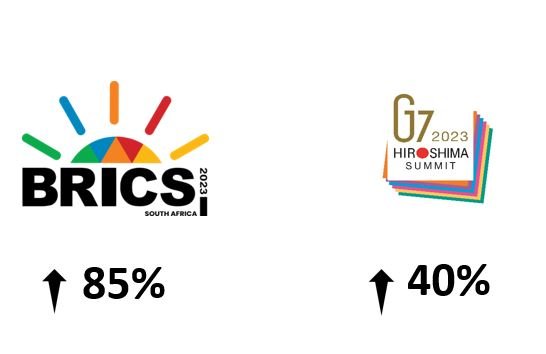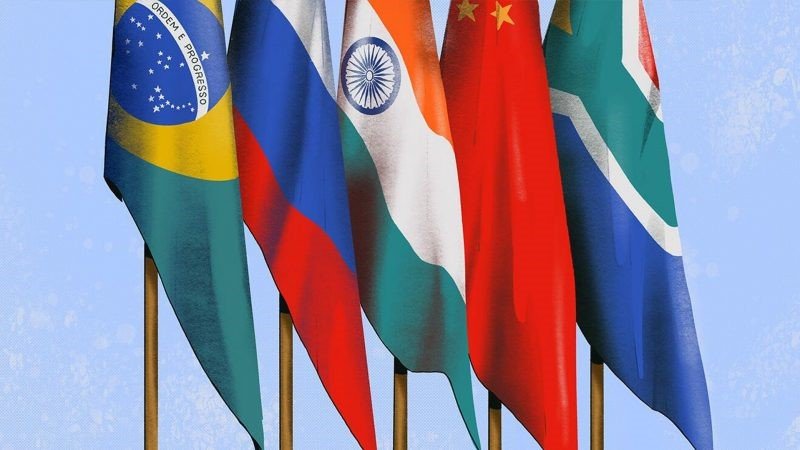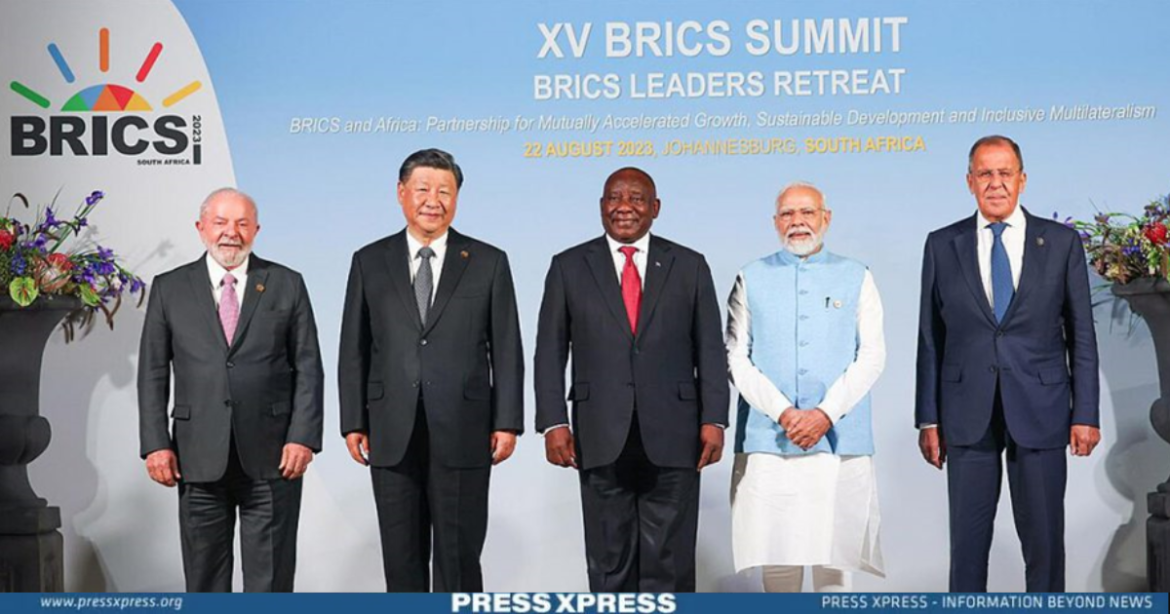Key highlights
- Original Cohort: Brazil, Russia, India, China, South Africa
- Expanded to include: Egypt, Ethiopia, Iran, Saudi Arabia, United Arab Emirates
- Expected Increase: 45% over the next 10 years
- Accounts for nearly 36% of G7 countries’ global GDP
In the year 2024, the BRICS alliance is not only witnessing expansion but also anticipates a remarkable surge in its millionaire count over the next decade, as indicated by recent reports. The BRICS consortium, comprising Brazil, Russia, India, China, and South Africa, is poised to experience an astounding 85% increase in the number of millionaires hailing from these nations. This projection far surpasses any other group of countries within a similar time frame.
On the contrary, the G7, a group of advanced economies, is projected to witness a surge of just over 40% in total millionaires during the same period. The BRICS nations have recently achieved a combined investable wealth value of a staggering $45 trillion. With the forthcoming rise in millionaires alongside the escalating investable wealth, the alliance is significantly bolstering its financial prowess in 2024.

Current Wealth Landscape
According to a comprehensive report from Henley and Partners, the BRICS alliance presently boasts 1.6 million millionaires, with an additional 549 billionaires within its bloc. Delving deeper into the dynamics of private wealth, the report unveils a remarkable 92% growth in China’s private wealth over the past decade, marking it as the highest among the BRICS nations. This exponential growth trajectory is expected to persist in the coming decade, extending to both the founding BRICS members and the newly integrated nations.

Opportunities
While China has witnessed a steady increase in its millionaire count since 2013, other major BRICS countries such as Brazil, South Africa, and Russia have experienced a decline. Particularly, Russia faces significant challenges in catching up due to the economic sanctions stemming from its invasion of Ukraine. Nonetheless, with concerted efforts within the bloc and increased financial backing, the path to recovery for Russia may not be as arduous.
By reallocating funds back into the bloc and its New Development Bank, the BRICS consortium can fuel further projects and stimulate the development of businesses and economies. This, in turn, will pave the way for the creation of more opportunities for millionaires within the alliance. The collaborative approach of BRICS members underscores their commitment to fostering economic prosperity and wealth creation across the globe.
BRICS Alliance Challenges US Dollar Dominance
Many analysts argue that the longstanding dominance of the US dollar on the global stage, which has persisted for nearly eight decades, may be on the verge of decline.

While this scenario is conceivable, factors such as economic crises, heightened internal divisions, and significant geopolitical challenges could potentially precipitate a downturn in the currency’s status. The process of de-dollarization could gather momentum, especially with the emergence of alliances like BRICS, particularly in light of largely ineffective sanctions against Russia.
BRICS is poised to challenge the traditional financial world order, which has long been dominated by the US and its Western allies. Developing countries are actively pursuing the establishment of their own financial institutions as they seek to reduce dependence on the US dollar. This move poses a significant challenge to the established order, with BRICS countries aiming to reshape the global financial landscape by curtailing American hegemony.
India, China, Russia, the UAE, and Saudi Arabia, as part of BRICS, have initiated efforts to conduct global trade transactions using local currencies. China and Russia, in particular, are leading initiatives to encourage other developing nations to move away from reliance on the US dollar. This shift could have profound implications for the US economy, potentially complicating its efforts to finance deficits.
Elvira Nabiullina, Governor of Russia’s Central Bank, has announced the Kremlin’s intention to put forward substantial proposals aimed at promoting the interests of BRICS countries in the near future. Among these proposals, she highlighted the establishment of new credit rating agencies tailored to the specific needs of BRICS nations.
In a world where political dynamics and global influence are constantly evolving, China, under the leadership of Xi Jinping, is strategically expanding its reach. While facing domestic hurdles and Western tensions, China is making inroads by doubling the size of BRICS and appealing to the global South with economic and ideological allure. The contrasting responses to Confucius Institutes in the West and the Global South exemplify this multifaceted approach, as China navigates a complex global landscape to secure its place on the world stage.
In conclusion, the BRICS alliance stands on the brink of a transformative decade, characterized by unprecedented growth in millionaires and investable wealth. As these nations navigate challenges and seize opportunities, their collective endeavors are poised to reshape the global economic landscape, heralding a new era of prosperity and inclusivity.


